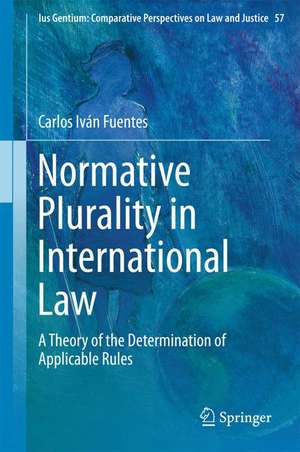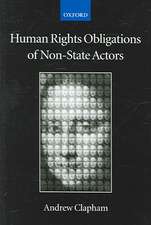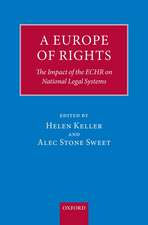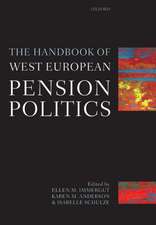Normative Plurality in International Law: A Theory of the Determination of Applicable Rules: Ius Gentium: Comparative Perspectives on Law and Justice, cartea 57
Autor Carlos Iván Fuentesen Limba Engleză Hardback – 9 sep 2016
| Toate formatele și edițiile | Preț | Express |
|---|---|---|
| Paperback (1) | 725.43 lei 6-8 săpt. | |
| Springer International Publishing – 9 sep 2018 | 725.43 lei 6-8 săpt. | |
| Hardback (1) | 731.41 lei 6-8 săpt. | |
| Springer International Publishing – 9 sep 2016 | 731.41 lei 6-8 săpt. |
Din seria Ius Gentium: Comparative Perspectives on Law and Justice
- 20%
 Preț: 1128.14 lei
Preț: 1128.14 lei - 20%
 Preț: 1565.15 lei
Preț: 1565.15 lei - 18%
 Preț: 1115.28 lei
Preț: 1115.28 lei - 18%
 Preț: 904.28 lei
Preț: 904.28 lei - 18%
 Preț: 1001.81 lei
Preț: 1001.81 lei -
 Preț: 180.18 lei
Preț: 180.18 lei - 24%
 Preț: 787.30 lei
Preț: 787.30 lei - 18%
 Preț: 1115.28 lei
Preț: 1115.28 lei - 15%
 Preț: 635.31 lei
Preț: 635.31 lei - 18%
 Preț: 1108.67 lei
Preț: 1108.67 lei - 18%
 Preț: 1007.97 lei
Preț: 1007.97 lei - 18%
 Preț: 784.79 lei
Preț: 784.79 lei - 18%
 Preț: 1223.11 lei
Preț: 1223.11 lei - 18%
 Preț: 891.02 lei
Preț: 891.02 lei - 18%
 Preț: 1009.40 lei
Preț: 1009.40 lei - 18%
 Preț: 1005.74 lei
Preț: 1005.74 lei - 18%
 Preț: 1014.89 lei
Preț: 1014.89 lei - 18%
 Preț: 896.70 lei
Preț: 896.70 lei - 15%
 Preț: 641.85 lei
Preț: 641.85 lei - 18%
 Preț: 779.71 lei
Preț: 779.71 lei - 18%
 Preț: 1010.79 lei
Preț: 1010.79 lei - 18%
 Preț: 1010.03 lei
Preț: 1010.03 lei - 18%
 Preț: 950.52 lei
Preț: 950.52 lei - 15%
 Preț: 638.76 lei
Preț: 638.76 lei - 18%
 Preț: 947.50 lei
Preț: 947.50 lei - 20%
 Preț: 564.76 lei
Preț: 564.76 lei - 18%
 Preț: 1115.14 lei
Preț: 1115.14 lei - 18%
 Preț: 944.82 lei
Preț: 944.82 lei - 15%
 Preț: 635.80 lei
Preț: 635.80 lei - 15%
 Preț: 637.59 lei
Preț: 637.59 lei - 15%
 Preț: 643.65 lei
Preț: 643.65 lei - 24%
 Preț: 809.15 lei
Preț: 809.15 lei
Preț: 731.41 lei
Preț vechi: 891.96 lei
-18% Nou
Puncte Express: 1097
Preț estimativ în valută:
139.98€ • 145.02$ • 116.82£
139.98€ • 145.02$ • 116.82£
Carte tipărită la comandă
Livrare economică 21 martie-04 aprilie
Preluare comenzi: 021 569.72.76
Specificații
ISBN-13: 9783319439273
ISBN-10: 3319439278
Pagini: 265
Ilustrații: XXVI, 240 p.
Dimensiuni: 155 x 235 x 16 mm
Greutate: 0.55 kg
Ediția:1st ed. 2016
Editura: Springer International Publishing
Colecția Springer
Seria Ius Gentium: Comparative Perspectives on Law and Justice
Locul publicării:Cham, Switzerland
ISBN-10: 3319439278
Pagini: 265
Ilustrații: XXVI, 240 p.
Dimensiuni: 155 x 235 x 16 mm
Greutate: 0.55 kg
Ediția:1st ed. 2016
Editura: Springer International Publishing
Colecția Springer
Seria Ius Gentium: Comparative Perspectives on Law and Justice
Locul publicării:Cham, Switzerland
Cuprins
Chapter 1. Introduction.- Chapter 2. Talking About Sources: The Constant Reliance on a Non-Objectified Element.- Chapter 3. The Imperfect Paradigm: Article 38 of The Statute Of The International Court Of Justice.- Chapter 4. Human Rights as a New Paradigm.- Chapter 5. Normative Plurality in International Law.- Chapter 6. General Conclusion.
Textul de pe ultima copertă
This book provides a theoretical framework for explaining the choices made by international decision-makers in terms of what constitutes law. It comprehensively analyzes the practice of human rights courts in applying legal instruments outside their competence and proposes that this practice recognizes that different normative instruments coexist in an un-ordered space, and that meaning can be produced by the free interaction of those instruments around a problem. Based on this, the book advances its normative plurality hypothesis, which states that decision-makers must survey the acquis of international law in order to identify all the instruments containing relevant normative information for a particular situation. The set of rules of law applicable to the situation must then be complemented with other instruments containing specific normative information relevant to the situation, resulting in a complete system of norms advancing a common purpose.
Caracteristici
Is the first to comprehensively analyze the practice of human rights courts in applying legal instruments outside their competence Provides a theoretical framework for explaining the choices made by international decision-makers in terms of what constitutes law Presents the problem of sources of international law from the point of view of Scandinavian realism Includes supplementary material: sn.pub/extras
















